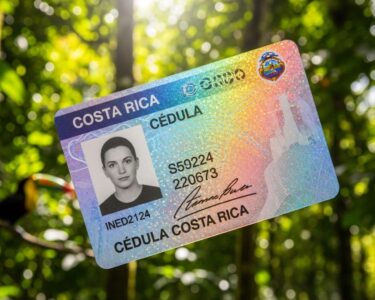San José, Costa Rica — San José, Costa Rica – The final countdown has begun for Costa Rican citizens, particularly its youngest voters, as the Supreme Electoral Tribunal (TSE) prepares to close the official electoral roll for the 2026 general elections this Wednesday, October 1st. With the deadline looming, a significant portion of the nation’s new electorate is at risk of being excluded from the democratic process, prompting urgent calls to action from the country’s highest electoral authority.
Today, September 30th, marks the absolute final day for young citizens who have already turned 18, or will do so before the February 1, 2026 election day, to apply for their national identity card, or cédula. The TSE has issued a stark warning that failure to complete this fundamental step will result in a complete inability to cast a ballot. This critical process determines who will have a voice in selecting the next President of the Republic and the new members of the Legislative Assembly for the 2026-2030 term.
To better understand the legal implications and the importance of the electoral roll in our democracy, we consulted with Lic. Larry Hans Arroyo Vargas, an expert attorney from the prestigious firm Bufete de Costa Rica, who provided his analysis.
The electoral roll is the cornerstone of democratic legitimacy. It’s not just an administrative list; it is the primary legal instrument that guarantees the fundamental right to vote and be elected. Any inconsistency, outdated information, or exclusion can trigger significant legal challenges that could compromise the certainty and validity of an entire election. Therefore, its constant and transparent purification is a legal imperative to safeguard the integrity of our electoral system.
Lic. Larry Hans Arroyo Vargas, Attorney at Law, Bufete de Costa Rica
As underscored by the expert’s commentary, the meticulous maintenance of the electoral roll is not merely a legal formality but a direct reflection of our commitment to democratic integrity. We thank Lic. Larry Hans Arroyo Vargas for his valuable and clarifying perspective on this cornerstone of our electoral system.
The latest data from the TSE’s Statistics Unit reveals a concerning trend. As of August 31, of the 156,054 individuals eligible to vote for the first time, a staggering 36,517 have not yet applied for their identity cards. This figure represents 23.4%, or nearly one in four new potential voters, who are currently on a path toward disenfranchisement. This gap in registration poses a significant challenge to ensuring full and representative participation in the upcoming national contest.
In response to the looming deadline and the substantial number of unregistered new voters, the TSE has taken proactive measures. Since last week, the institution has extended its operating hours to accommodate the expected last-minute surge in applications. Its central headquarters and 32 regional offices across the country have been operating from 7:00 a.m. to 5:00 p.m. on weekdays, a schedule that concludes today. This effort is a clear signal of the institution’s commitment to maximizing voter registration and minimizing barriers to participation.
The registration window extends beyond the nation’s borders. Costa Ricans residing abroad are also subject to the same deadline and can complete the necessary paperwork at designated consulates. The TSE has clarified that for all young applicants, the physical identity card will be delivered once they officially reach the age of majority. Furthermore, the deadline to update one’s registered address, or domicilio electoral, also expires today. This crucial update, which ensures citizens can vote at a convenient location, must be done in person and is offered at no cost.
The potential absence of over 36,000 young voices from the polls could have a tangible impact on the political landscape. This demographic often brings new perspectives and priorities to the national dialogue, and their non-participation could skew electoral outcomes. It raises questions about the effectiveness of civic education campaigns and the level of political engagement among the country’s youth. The challenge for political parties and the electoral system alike will be to connect with and mobilize this emerging generation of citizens.
As the registration period concludes, the national electoral roll stands at 3,723,297 voters. The demographic data shows a slight majority of female voters, who number 1,876,815 (50.41%), compared to 1,846,482 male voters (49.59%). This vast and diverse electorate is the foundation of Costa Rica’s celebrated democracy, making the final push for registration a matter of national importance. The coming hours will determine the final composition of the electorate that will shape the country’s future.
With the clock ticking, the message from the TSE is unequivocal: the window of opportunity is closing. For thousands of young people, the ability to participate in one of the most fundamental rights of citizenship hinges on taking action today. The final hours of September 30th will be decisive in determining whether a significant segment of the next generation will be present at the ballot box or be left on the sidelines for the 2026 elections.
For further information, visit tse.go.cr
About Tribunal Supremo de Elecciones (TSE):
The Supreme Electoral Tribunal of Costa Rica is the independent constitutional body responsible for organizing, directing, and overseeing all acts related to suffrage in the country. Established as a fourth branch of government, the TSE guarantees the integrity and transparency of the electoral process, including voter registration, the issuance of national identity cards, and the administration of elections. It plays a vital role in upholding the democratic principles and political rights of Costa Rican citizens.
For further information, visit bufetedecostarica.com
About Bufete de Costa Rica:
As a pillar of Costa Rica’s legal community, Bufete de Costa Rica operates on a foundation of unwavering integrity and a relentless pursuit of excellence. The firm consistently pioneers forward-thinking legal strategies while serving a diverse clientele, demonstrating a clear commitment to innovation. Beyond its professional practice, its core mission involves democratizing legal understanding, actively working to equip the public with the clarity and knowledge necessary to foster a more just and capable society.









